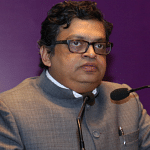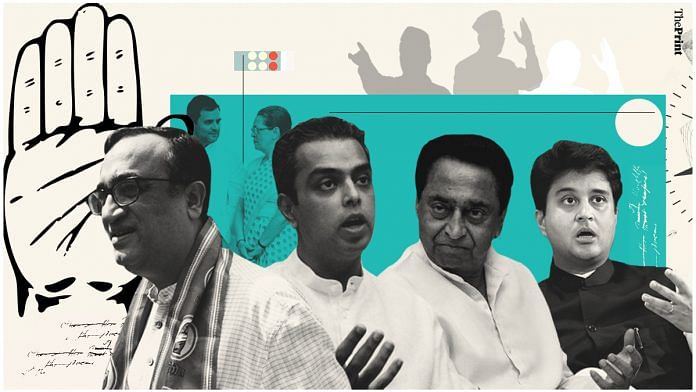The Congress is seeing several of its leaders engage in public spats. Ajay Maken criticised Milind Deora for praising the Aam Aadmi Party and asked him to “leave” the party if he wanted. Madhya Pradesh CM Kamal Nath dared Jyotiraditya Scindia to launch a protest after Scindia demanded that he fulfil manifesto promises. Sharmishtha Mukherjee called out P. Chidambaram last week for congratulating Kejriwal’s party for its Delhi win.
ThePrint asks: Deora, Kamal Nath, Scindia, Ajay Maken: Congress imploding or showing internal democracy?
Unlike Modi-Shah’s BJP, Congress has internal transparency and allows its members to express dissent
Madhu Gaud Yaskhi
National Secretary and Spokesperson, Congress
The Congress party has always been known for its internal democracy right from Jawaharlal Nehru’s days. It has always allowed dissent and difference of opinion. The same practice was also adopted during the presidency of Rahul Gandhi. He was the one who introduced the system of electing candidates for the National Student Union of India, Congress’ student-wing. Even during the 2014 Lok Sabha election, it was Rahul Gandhi who started internal elections to choose the party’s candidates.
In the BJP, senior leaders like Yashwant Sinha, Udit Raj, Ram Jethmalani were thrown out of the party for questioning the party’s top leadership. Even in the case of the AAP, Alka Lamba, Prashant Bhushan and every other member who questioned Arvind Kejriwal’s style of working was thrown out of the party.
The fact that the Congress is run only by one family is an allegation levelled by the BJP. The Gandhis are not the only one running the show. Senior leaders like A. K. Antony, Manmohan Singh and Ahmed Patel have always been involved in decision-making. Unlike in Modi-Shah’s BJP that has no internal democracy, everything in the Congress happens through a process.
We have built a good practice of allowing Congress members to express dissent. Jyotiraditya Scindia’s job as part of the Congress’ manifesto committee is to make sure that there are no shortcomings. People are observing and accepting this kind of transparency in political parties. This is the basic difference between the BJP and the Congress.
Congress doesn’t have internal democracy because no one challenges top brass. Party lacks direction and will
 Gopal Krishna Agarwal
Gopal Krishna Agarwal
National Spokesperson BJP
The discontent within the Congress party is due to lack of leadership at the top. The senior leaders are not giving guidelines to the people and therefore, all the discontent we see becomes even more evident with every election defeat.
The opposition’s role is important in democracy and we expect the Congress to play that role well. The incoherence in the party is due to its questionable position on issues of national importance — questioning the Army on the Pulwama attack or doing flip-flop on the dilution of article 370 from Kashmir. The Congress was, in the past, supportive of amending India’s citizenship laws like CAA, conducting the NRC in Assam and NPR, but when the BJP implemented these laws and procedures, the party suddenly lost its nerve. Congress leaders are taking diverse positions on various issues, thus, contradicting themselves.
The Congress also fails to see its own supportive role in communal politics on minority issues. It is becoming more and more irrelevant in national politics.
There is no internal democracy in the Congress because no one ever challenges the top leadership. It lacks direction and the will to lead. When Rahul Gandhi resigned as the Congress president, Sonia Gandhi was made the interim chief. Democracy allows everyone an equal opportunity to rise to the top level, but this is something that has not materialised within the Congress.
‘Young’ Congress members getting edgy, restless over delay in Rahul Gandhi’s appointment as party president
 Rasheed Kidwai
Rasheed Kidwai
ORF visiting fellow, author and journalist
It all comes down to Rajya Sabha berths and revamping the All India Congress Committee. Congress members of all hues and shades, particularly those “young” leaders within the 45-55 age bracket, are increasingly getting restless and edgy over Rahul Gandhi’s delay in taking over as the party president. They, having invested time, energy and loyalty in Rahul, face uncertainties if the Gandhi scion is not appointed as the Congress president by March-April 2020. The enormity of defeat in Delhi and the old guard consolidating their position has made the likes of Jyotiraditya Scindia, Milind Deora, Sharmistha Mukherjee and others vulnerable.
Sonia Gandhi, as the Congress’ interim chief, has to take a call on the choice for a new party president, decide on the Congress working committee elections and “ground rules” for Rajya Sabha nominations. If “defeated candidates” of the 2019 Lok Sabha election are barred from getting Rajya Sabha berths, then Scindia, Digvijaya Singh and a range of other party leaders will be out of the race. Sonia, however, seems reluctant to appear harsh against Scindia, who she considers as her “third child”.
These are not signs of internal democracy but desperation, posturing and realpolitik. The outcome is unlikely to please all.
Public spats within Congress show how deep divisions are. The party is floundering
 Advaita Kala
Advaita Kala
Author, screenwriter and columnist
There is a difference of opinion among senior leaders of the Congress and a feeling of abandonment among the younger ones who are looking for direction and feeling lost. The top leadership of the Congress is inaccessible and that is why the young ones have to find their way around. The Congress lacks an ideology. Due to the lack of step-by-step guidance and a clearly-outlined ideology, these spats become visible in the public domain. It is almost like being blindfolded in the dark, and it doubles the confusion.
A decade from now, it is quite possible that the AAP could replace the Congress as the alternative in national politics. The Congress of today is, up to a large extent, threatened by the AAP than any other party, including the BJP. After its defeat in the Delhi assembly election, the Congress is floundering. The fact that these differences among Congress leaders are being expressed in the public domain only shows how deep the divisions are. Be it Rajasthan, Madhya Pradesh or Delhi, the Congress is now like a ship in the sea with no anchor or a map.
Congress’ high command culture has finished internal democracy, letting disillusionment fester for decades
 Anil Kumar Verma
Anil Kumar Verma
Director, Centre for the Study of Society and Politics
The recent spats within the Congress are a clear sign of restlessness brewing. On umpteen occasions, the leadership of the Nehru-Gandhi dynasty, has been challenged in the past. But, somehow, the one at the helm got through. However, after the departure of Indira Gandhi, the peripheral elements in the Congress got control of the leadership.
Unlike Indira Gandhi, Rajiv, Sonia and Rahul Gandhi, these leaders failed to enthuse the people. This led to successive electoral defeats and shrinkage of the Congress’ social and power base. The Congress’ high command culture virtually finished democracy within the party.
The promotion of incompetence at the cost of party leadership at national, regional and grassroots level had been so rampant that the Congress workers saw no hope of upward movement in party hierarchy and shifted elsewhere. Whatever social support exists on the ground is because of traditional loyalty and linking the current Congress to the party that fought in India’s freedom struggle.
A message has gone to people that young brilliant Congress members are getting marginalised leading to their indifference towards the party. So, the recent outburst by some ‘young’ Congress leaders is indicative of the lack of internal democracy, and not its beginning. Old and young Congress members and party workers are getting disillusioned with the party and its leadership. If Congress wants to survive, it must rethink on the democratisation of the party’s leadership.
Also read: Does the Jawaharlal Nehru-Sardar Patel ‘rivalry’ matter to India in 2020?
By Unnati Sharma, journalist at ThePrint





Congress has long become a family party with scant concern for developing the same into a vibrant entity. New dynamic leadership & New relevant narrative is need of the time to stem the rot.
“Congress” and “Inner Democracy” are a contradiction in terms. It has been so ever since Indira Gandhi took over the old Congress and branded it as her own.
This is uncharted territory. The party – or at least some of its prominent members – is trying to cast off the yoke of the Gandhi family. Rahul Gandhi will not measure up in a million years. The family’s selfishness is impeding the natural ebb and flow of political fortune in a democracy. Beyond a point, the ruling party should not become complacent because of the inadequacy of the principal opposition party, its inability to put its house in order, to plan inter generational transition.